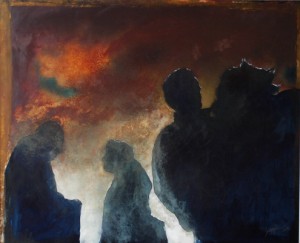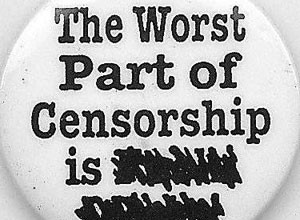
Whispers by Scharjeel Sarfaraz. Image Courtesy: ArtChowk Gallery
When the alarm goes off, Heidi immediately looks at Asta’s empty place. The report she had been writing is lying on the desk in front of her computer. Heidi looks at her own screen, which displays columns of numbers. Now it is over; this is how it ends.
She closes her eyes and listens for the explosion that will come and drown out everything else: the heavy sounds of her colleagues jumping up, knocking their chairs over, and running across the gray-flecked floor. The shrill sounds. The screams. The alarms.
They are afraid. Heidi is sitting straight up on her chair; she does not need to look; she knows what they look like. How their faces are twisted and their eyes are spherical and milky, like dolls’ eyes.
She waits for the explosion, but it never comes.
Her boss sees that she is still sitting in the office and runs back to get her. He grabs her arm and pulls her along, to the back stairs, down and down. They are some of the last people to go down the stairs; the first run over each other on their way down. Things go worst for Asta, who breaks a leg.
But no boom ever sounds. No bomb explodes, and although Heidi knows that she was not the only one who was waiting for this, the word is never spoken. Fire alarm, false alarm, they say. No one talks about the fact that Asta was already on the back stairs when the alarm went off.
A few days later, Heidi offers to visit Asta in the hospital and give her a bouquet of flowers from the office. The boss thinks this is a good idea. “Very thoughtful,” he says, and smiles at Heidi. He is sitting with his legs crossed and bouncing one foot up and down as though to a melody only he can hear. He keeps on looking at Heidi. He licks his lips.
Heidi cannot take her eyes off the glistening tongue tip moving from one corner of his mouth to the other.
Asta looks surprised when Heidi comes into her room. Perhaps she had not expected a visitor; perhaps she had just not expected to be visited by Heidi. The bouquet is sumptuous: red peonies and yellow irises. Heidi has paid out of her own pocket to get a bigger one than the office usually pays for. She finds a vase and puts the bouquet on the windowsill, where it shines against the winter sky. She pulls her chair close to Asta’s bed and sits down; she has her bag on her lap. “Everyone wanted me to say hello and tell you they hope you’ll get well soon,” she says loudly, looking over her shoulder. There are no nurses in sight. Quickly, she takes the note she has written at home out of her bag. She holds it in front of Asta so she can read it. Asta reaches out for it, but Heidi holds on to it. She holds the note until Asta has read it and then puts it back in her bag. As soon as she is home, she will burn it.
I know that you set off the alarm. I believe that you were planning something more. I believe you will try again. I can help. We must talk.
Heidi has thought for a long time about that note and what it is that she is starting. Now or never—that is how she feels. She looks at Asta, searches for signs on her face. Asta is looking straight ahead, expressionlessly. Then she turns her face toward Heidi again, wrinkles her brows a little, then she smiles and nods.





[…] the latest book two of them is translated into english, ‘This will kill you‘ and ‘Assasination’) and have been writing for more than a decade. But only poems for a year or so. And then writing […]